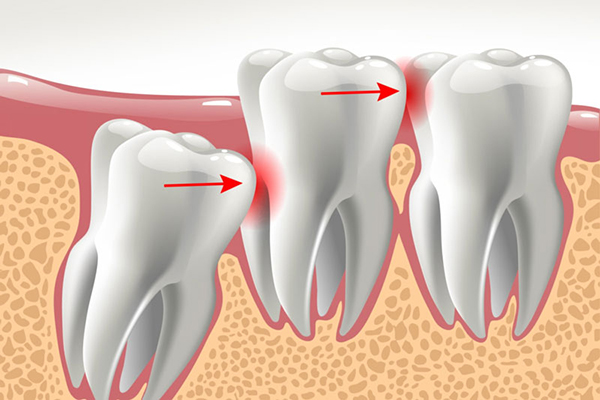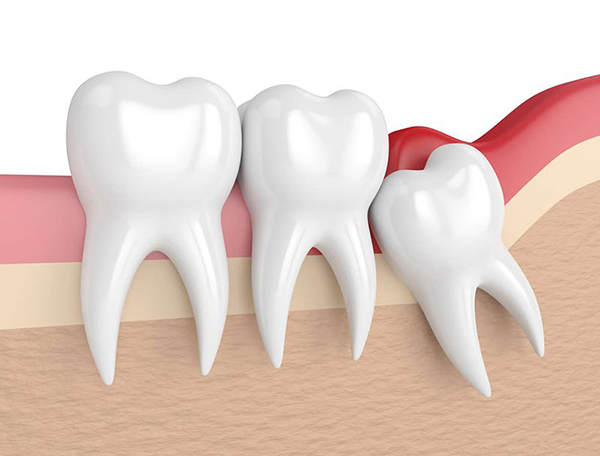How many days do wisdom teeth hurt
Wisdom teeth pain is the worry of many customers. The feeling of pain caused by wisdom teeth is a terrible feeling for every adult. So how does this tooth grow, how to relieve pain completely? The experts at Home Dental will explain in the following article.
Contents
How many days does wisdom teeth hurt?
According to Nguyen Anh Ngoc, whether wisdom teeth pain is short or persistent depends on each person. Lucky people only feel pain for about 2 days, while some people will last up to 1 week, 1 month or even year round.
Dr Ngoc said, according to the standard, an adult’s jaw usually has 4 wisdom teeth. However, the situation of wisdom teeth eruption varies from person to person. Some people don’t grow any wisdom teeth, some people only grow 1-2 ones, but some people even have 6, 8 wisdom teeth on the jaw.

The appearing and growth process of wisdom teeth is as follows:
- Wisdom teeth begin to grow from the age of 18 to 25. However, this tooth can appear earlier or later than those ages.
- When the teeth grow, the first phenomenon will be pain and swelling of the gums. With straight teeth, when touching the tongue to the gums, a small, hard lump will appear. As for teeth that grow underground, only an ultrasound can tell.
- After about half a month, the inner gum swells abnormally, causing the cheeks to swell. This is where the wisdom teeth are located. At this time, the teeth are easily detected thanks to the white tip emerging.
- The longer the teeth grow, the more painful it can be. The level of the pain depends on the growing position, such as growing horizontally, growing on the left side, growing on the right side, growing underground covering the gums,…
- The time for wisdom teeth to completely grow can be from 2-4 months or up to nearly 1 year. The shape of the teeth is usually short and the size is as big as the molars.
Causes of wisdom tooth pain
Wisdom tooth pain is a common symptom, but not all symptoms are normal. There are pain symptoms due to disease rather than pain caused by the affected surrounding tissue . So what kind of pain is considered dangerous and what is the cause of wisdom tooth pain?
Wisdom teeth growth
If you are over 18 years old and feel pain in the inner jaw, swollen gums for a few days, it is most likely a sign of wisdom teeth starting to grow. This is a normal sign of pain and there is no need to panic.
Wisdom teeth grow at the end of the jaw when the arch is full of room for permanent teeth, but they still grow and crowd with the gums, hitting the gums, causing pain, swelling, redness, soreness.
Most adults will experience this “haunting” period at least once in their life. If the pain is tolerable, there is no need to worry, it is just because the teeth are growing. If the pain is too much, go to the doctor for early treatment.

Tooth decay
Tooth decay can occur anywhere in the jaw, but the position near the wisdom teeth is the most susceptible. As this tooth is often misaligned, it does not match the adjacent teeth. The growing space is also tight.
When eating or swallowing food, they will get into the crevices of the teeth, cling to the chewing surface of the teeth or get stuck in a gap near the wisdom teeth. Brushing, flossing, gargling only cleans the outside, the inside is very difficult to see, thus it is not easy to remove the food.
Food that stays for a long time will produce a bacterial colony, which will spread to the other area of the mouth. They are the agents that make the mouth foul, teeth have plaque, especially caries that erode tooth enamel, dentin and then tooth pulp. At this time, the tooth will be in severe pain, the whole jaw will be so sensitive that it will not be possible to open the mouth, eat or drink or go to sleep.
Wisdom teeth cause complications for gums, nerves, and adjacent teeth
Mesial impacted wisdom teeth will pierce the crown, root, and touch the nerve of tooth number 7. At that time, we will experience temporary numbness of the lips and jaw. More negatively, the wisdom teeth will destroy all tooth number 7, make it loose and fall out.
Damage to the gums
Vertical impacted wisdom teeth are mostly blocked and covered by the gums. The chewing surface of wisdom teeth rubbing against the gums can cause this tissue to scratch, bleed, and swell. The space between the mulberry molars and gums will be an “ideal” place for leftovers to reside, from which bacteria appear and cause gum infections, tooth abscesses, wisdom tooth decay,…
Jawbone cysts
As wisdom teeth grow, they collide with many hard and soft tissues. These collisions or the wisdom teeth themselves can cause cysts in the bone of the tooth. These are benign cysts but if left for a long time, they will cause difficult-to-treat complications in the jawbone.
How to reduce the pain of wisdom teeth effectively
Wisdom tooth pain is a dull pain that is difficult to treat completely right away. The pain greatly affects eating, resting and work progress,… Here are 5 ways to reduce wisdom tooth pain.
Proper oral hygiene
3 common ways of oral hygiene:
- Brush teeth evenly with toothbrush and toothpaste
- Use dental floss to brush between teeth
- Gargle with salt water or a specialized antibacterial mouthwash.
When wisdom teeth erupt, the gums are red and swollen and the tissue around the teeth is very vulnerable, so brush your teeth gently (use a soft brush head). Do not put your hands or chopsticks, spoons into the gum area. It is imperative to rinse your mouth after meals and before resting time in the evening to wash away leftovers and disinfect the entire mouth.
Oral hygiene is essentially to make the wisdom tooth area clean, not forming bacteria. However, it does not have the effect of reducing the pain of wisdom teeth.

Suitable diet for wisdom teeth
Many people may not know that eating will have a big impact on the pain level of wisdom teeth. When teeth come in, if we eat a lot of sticky foods and hot or cold food, the feeling of pain will resist. As plaque gets stuck on the teeth and gums, bacteria has the ideal condition to appear and disturb adjacent tissues and teeth.
Therefore, you should limit your intake of the following foods and drinks:
- Avoid eating nuts such as beans, peanuts, corn, etc.
- Avoid eating foods that are too spicy, too hot or cold like hot pot, chili sauce, ice cream, hot water
- Limit strong bites and eat sweets such as snacks, candies, chocolates, etc.
Besides, please add porridge, soup, nutritious water such as fruit juice, smoothies, stewed meat, vegetables … to be both easy to eat and to nourish healthy teeth from the inside.
Cold compress
Cold compress or applying ice is a pain and swelling reduction tip suggested by many dentists. However, unlike other areas, please pay attention not to apply ice directly on the wisdom teeth, but only on the cheek where the swelling is.
Whenever you feel pain, put a few small ice cubes in a plastic bag and cover with a towel. Then apply it on the cheek for 2-3 minutes. To reduce swelling, apply 5 to 10 times a day.
Remove wisdom teeth
According to Dr. Nguyen Anh Ngoc, if wisdom teeth cause pain, soreness, swelling or gums irritation… for a long time, whether they are impacted (partially or fully trapped in the gum) or grow straight, they should be removed as soon as possible.
- For straight teeth, there may be no pain at the moment or the pain level is not much, but in the future, there is still the possibility of causing pain, gums, swelling of the face (if it does not hurt, it does not need to be removed).
- For impacted teeth, misalignment not only causes prolonged pain, but also causes the roots and pulp of the adjacent teeth to be destroyed; lead to torn gums and jaw bone cyst, sensory disturbances in the mouth and tongue…
Therefore, the best way to end the pain is to completely remove the wisdom tooth root, returning a normal arch like before this tooth appeared.
Home Dental is one of the pioneers in applying Piezotome sound wave wisdom tooth removal technology. This is a technology that is evaluated by experts in the world for absolute accuracy, safety, non-invasive tissue, no bleeding, and fast healing.
Home Dental has a team of highly qualified, professional and experienced doctors. Every wisdom tooth removal case is controlled, including risk treatment options and the success rate after removal is absolute.
How many days wisdom teeth hurt or whether the pain is mild or severe depends on each person. According to the doctor’s advice, if a wisdom tooth causes pain, and swelling more than 3 times a year, it should be removed soon.
